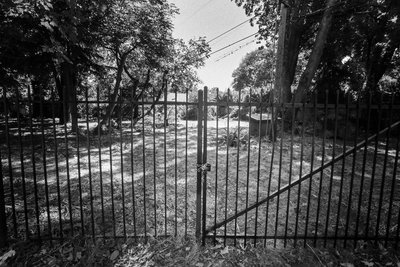Despite the sunny weather on a Thursday morning, Scobert Gardens Park on 4th and Van Buren is mostly empty. On one of the first smoke-free days from the wildfires burning across Oregon, there is more garbage in the park than anything else.
A backpack and a coat are stuffed under the park’s small play structure. A woman is sitting on a bench; a man is lying on his side on the ground, talking.
Sometime this fall, conversations about the future of the Whiteaker’s Scobert Gardens will begin. Emily Proudfoot, a landscape architect with Eugene Parks and Open Spaces department, says Scobert Gardens has seen years of abuse.
“There’s drug dealing, prostitution, people having sex there, making a ton of noise, partying,” she says. “It’s grown wildly in the past five years to proportions that none of us could have ever imagined. The number of homeless people has just burgeoned. On top of that, like two years ago, the criminality in parks went crazy.”
The issues with the park are far from new — EW previously covered the history of Scobert Gardens in August 2016, “A Walk in Needle Park.”
On this day, a pair of shoes, tons of cigarette butts and rotting apples from a tree are scattered on the ground. A bicyclist riding past says to watch where you walk because the park is notorious for stray needles. He says the park is empty because police typically patrol it early in the morning and kick people out.
Another bicyclist riding through the park stops and gets off his bike. Jeremiah Owens says he’s on his way to his home in West Eugene. As a kid, he says, he used to hang out in Scobert Gardens to sell drugs. “I had good grades,” he says. But he also excelled at making money in the park.
Owens is clean now and works drying wood at a mill — a job he found after doing a four-and-a-half year stint in prison. “I like it,” he says about his job. “I could have gotten five years,” but says he was released early for good behavior.
Owens says both heroin and meth are used in the park. “For $10 you can buy enough meth that can keep you up for three days,” he says. When people have no place to go, staying awake can help protect their space and belongings, he adds.
Scott Milovich with the Eugene Parks and Open Space department says the department doesn’t track the specific cost of each park but estimates the cost of clean up is between $250,000 and $300,000 annually.
“The solution isn’t maintenance,” Milovich says. “We have a lot of cooperation from EPD and the park ambassador program.”
He says the department is trying to help people understand the rules of the parks. “There’s a lot of work going on in the parks department to do what we can and work with social services agencies to try and find other solutions.”
Proudfoot says there’s no “magic bullet” that will solve the complexity of issues related to illegal and negative activities that go on in parks, but the community will begin having conversations about the future of Scobert Gardens this fall.
“People have a lot of pain around it, and they want to see change and the city hasn’t been able to afford to do that for a super long time,” Proudfoot says. “I don’t think you’ll see anything happen there for a couple of years, but the idea is to engage the neighborhood at a very deep level around why we need to do this, how we need to do it and what creates the best outcome.”
No specific dates have been set for the park’s discussion. For the most up-to-date information, visit the city’s Eugene Parks and Open Space website, eugene-or.gov/185/Parks-and-Open-Space.
